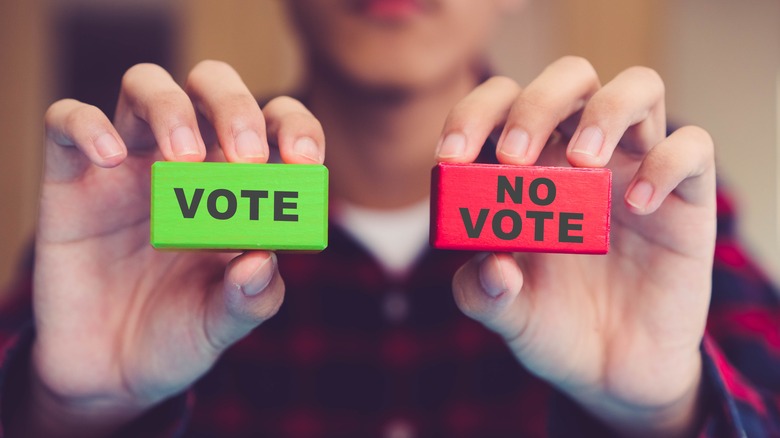5 Pros And 5 Cons Of A Monopoly
Monopolies are often thought of as a bad thing in the consumer marketplace. A monopoly occurs when one business (or a coordinating group of corporate entities) becomes so large in one component of the market that it can effectively bar competitors from entering this space. This leaves consumers with only one choice when seeking any given type of product or service. Generally speaking, when a business monopolizes a segment of the market it leads to increased prices for buyers and can even result in an accumulation of political power for the enterprise, potentially making brands even less likely to participate in a good faith back and forth with their clients.
Some common monopolies in the United States are in the industries of rail services, energy, and cable television services. One feature that makes the monopoly hard to pin down, however, is that regional cooperation can give a monopolizing brand clout when faced with allegations or charges of antitrust.
While often regarded with a negative overall connotation, the existence of monopolies can actually benefit consumers in certain ways. With these five advantages and disadvantages in mind, you can better understand how monopolies come into being and how they operate both in your best interest as a consumer and against it.
The Takeaways: Monopoly power and government regulation can create certain, ideal marketplace segments
One key takeaway in discussing monopolies is that they can be an entirely beneficial asset to a community or a country. Yet, monopolies operate in coordination with the needs of consumers when they are regulated by a federal authority, and often only then. This is an important point to make when it comes to thinking about these types of immensely powerful businesses. The startup costs to compete with a railroad operator, electricity provider, or specialized waste management service, for instance, are astronomical and bar entry for all but the ultra-wealthy investor looking to jump into an entirely new sector. This type of investment virtually never happens, leading to the existence of certain regulated monopolies that are simply essential to providing consistent services to customers.
Yet monopolies can be an entirely bad thing too. Monopoly power can easily run amok, interfering with political and social life and issues, and leading to unfair business operations that stifle innovation in the marketplace and provide customers with limited or poor quality goods. There is a happy medium that must be struck when it comes to monopoly power in the marketplace, and there are truly a number of positive elements and negative consequences that come along with the creation of a monopoly in any market sector.
Pro: Economies of scale reduce certain pricing models for consumers
One major asset that a monopoly can provide to consumers is the weight of economies of scale. Essentially, this involves minimizing the cost of doing business. Energy companies are some of the most visible monopolies in the world; right behind them, rail line operators and public transit authorities provide critical business infrastructure that individual brands likely couldn't muster. Many cities and countries outsource these basic services to private industry rather than operating them in-house. But in order to run power lines to homes across a city or country, or move goods and people from place to place in railcars, there is a significant amount of infrastructure that must be put into place.
In order to operate in these business spaces, you'd need to spend a fortune on infrastructure before you could ever start offering services to consumers, leading to years or even decades of outgoing costs with no incoming profits to balance the budget. As well, if a new rail operator were to struggle through these early deficits and suddenly open a line between two cities, their prices would have to be exorbitant in order to recover initial startup costs. Existing players in the market don't have this same problem, their infrastructure has remained in place for decades or even centuries with routine maintenance being the primary cost of ensuring continuity of service. Therefore, there is no need to artificially inflate prices to recover previously invested capital.
Con: Monopoly operation can lead to depressed wages for employees
First of all, a true monopoly is one that employs a huge number of people in both the local setting and beyond. As a result, communities all across the country rely on jobs provided through these operations, and with such dependence comes the potential for wage manipulation. The job market is a fickle beast at best, and combined with the inclusion of health insurance through the workplace and other essential benefits, many people cannot afford to lose their job or quit and begin searching for a new one. Because of this, a monopoly could take advantage of the community and individual dependence on job stability and begin to depress wages in relation to typical inflation rates and other financial realities prevailing in the local area.
Shrinking buying power is a significantly bad thing for wage earners. It places a larger contingent of the population in jeopardy of losing their homes, not being able to eat every day, and more. But businesses are in the business to make money, and reducing wages is one potential avenue for growing profits. When it comes to a monopoly, the enormous sway that the brand has over social issues in the local setting plays a direct role in employees' ability to organize or quit and search for a new opportunity that pays better.
Pro: Monopolies are often more efficient than other potential competitors and can branch out successfully
In keeping with the conversation surrounding economies of scale, it's important to note that monopolies tend to be far more efficient than potential competitors in the market because of their enormous size. When it comes to manufacturing, for instance, massive order quantities from factories and other manufacturing centers allow businesses to save money on the unit cost to produce their goods, which can then be reinvested in a more streamlined business operation. One thing that sets large enterprises apart is the use of specialized accounting services and other financial management resources. Whether speaking of a natural monopoly (like a power company) or a manufactured one (such as in the well-known antitrust cases surrounding AT&T or Standard Oil, via HG) this trend persists across industries and national origin. Operational efficiency is crucial in developing a widespread and highly profitable business of any type.
This efficiency can lead to great things alongside some potentially negative consequences. Perhaps most visibly, a large and efficient brand can only get to this size and level of prominence by offering quality goods and services that consumers actually want. This means that it is virtually impossible for a company that doesn't offer a quality product to grow to this level of marketplace domination. One space of solace that consumers can take when procuring goods from monopolies is that the products are likely to be durable and useful.
Con: A monopoly leads to a reduction of choice for the consumer
Even though monopolies typically grow from successful companies that provide a valuable service, once competitors have been squeezed out of the marketplace the incentive to continue providing exceptional service is reduced. A monopoly is a business that no longer has to compete with others to maintain its position in the market, and this can lead to a shrinking of services that the business doesn't see as profitable. The result is a squeeze on those who rely on the business for their daily connectivity, food, and more, hurting the consumers who rely on them the most. Monopolies can essentially make their own rules in many aspects of the marketplace that they dominate.
This comes as a result of reduced or eliminated competition. The simple reality is that consumers have little to no choice when it comes to purchasing products or services that they require. Energy companies, for example typically operate without competition in regional zones. A consumer might only have one (or perhaps two) choices for their electricity service based on where they live in the country, effectively creating a situation in which anyone who wants to light their home in the evening must purchase this basic necessity through a brand that may or may not offer a quality service.
Pro: Monopolies can expand to include public goods that don't make a profit
Another important feature of monopolies comes in the form of business sectors that are not profitable. Brands that dominate their market space are able to branch out into new technologies and research areas that are essential to the public good and continued progress toward a better quality of life for the average consumer, even if these research areas act as financial money pits.
These types of expansions can be hard to quantify in some instances. For example, Elon Musk and Jeff Bezos have each leveraged their profits from their respective business empires to establish new companies focused on space exploration and celestial research. Space is historically an area that has not been profitable financially, but has provided a wealth of knowledge, information, and growth on a human level. While it can be argued that Amazon and Tesla may or may not operate as quasi-monopolies within their own spheres, the comparison remains apt when considering new research areas that can benefit humanity on a grander scale.
Con: This model can result in constantly increasing prices for customers
Alongside concerns over decreasing service availability, monopolies can also increase prices on a regular basis in ways that would not be possible in a truly free marketplace. There is a great line in "The Office" that might go unnoticed to the casual viewer but firmly captures the essence of monopoly power at work (Season 5 Episode 22, via IMDB). In the short run of episodes that featured the Michael Scott Paper Company, Michael attempts to steal a client from Dwight by noting that a discount from the larger brand today would only be used in an effort to run his small company out of business, eventually leading to a price hike shortly after when Dunder-Mifflin eventually became the only paper supplier in the area (as Michael and Dwight had already done to Prince Family Paper, a previous Scranton-area competitor).
This perfectly encapsulates one power that monopoly businesses enjoy. By trading as the only option in town, monopolies are able to charge whatever prices they want. These businesses can artificially inflate the cost of any type of product or service in order to drive profits. As long as consumers have no choice but to use their offerings, the monopoly holds all the power in this customer relationship. While there are many potentially beneficial qualities that monopoly operations can bring to a community, this is decidedly one of the worst consequences.
Pro: Monopolistic operation pushes profits back into local communities
Another important feature surrounding monopolies is the fact that these types of businesses tend to infuse capital back into the communities that support them. Enormous enterprises must maintain significant headquarters operations, and many even open second, third, and even fourth head-office-type spaces in strategic cities across the country or the world. When a big business opens a new office, an influx of professional talent quickly surges into the community. With these new professionals, comes the natural enlargement of service industry businesses and other enterprises. Growing community spaces always support increased capital flow throughout the local area, and within these big businesses, there is a consistency in this growth of community resources and general vibrancy.
When a big business comes to town, local communities can expect to see new restaurants, shopping centers, entertainment venues, and much more open up. This creates a wealth of new job opportunities for people already living in the community and serves as a beacon for new people moving to the area, as well. Monopolies tend to understand the importance of local outreach, and as a result, they work hand in hand with community leaders and others in the areas that they serve and are supported by.
Con: Quality control standards can become lax
Another important consideration to make when thinking about monopoly businesses is the opportunity to cut corners on quality control and other essential manufacturing or fabrication tasks. As with just about all other issues inherent to monopolies, the ability to sell a reduced slate of products also allows a monopoly to peddle inferior output. If there are no other viable businesses in the marketplace that can compete with a monopoly's product line, that business can afford to start cutting corners on quality control and other essential components of the back-end processes — and this does often happen, according to The Bell Journal of Economics. Quality standards can be a costly thing to uphold for a business. They slow down production and rollout times and inevitably remove some of the produced materials from the sales pipeline because manufacturing will never be 100% efficient.
But a business that has no material competition does not have to worry quite as much about the production standard of its products. This means that a monopoly can use a cheaper, and less professional, fabrication outlet or process, and can reduce or eliminate quality control measures designed to place only the best products on shelves for consumers to purchase.
Pro: Monopolies enjoy enormous bargaining power
Monopolies also enjoy significant bargaining power when it comes to working with vendors and suppliers. As an example, one primary reason for the rollout and expansion of federal medical coverage in the United States revolves around the government's hypothetical ability to negotiate with drug manufacturers on behalf of all Americans rather than just a subset of those already receiving the benefits of federal medical coverage.
When a business (or the government) is able to negotiate as the sole player in the industry, it has far more leverage when it comes to finalizing the details of any agreement. In the previous example, if the federal government were suddenly to support the insurance needs of every American, federal regulators could virtually set their own prices on goods and services supplied by third-party manufacturers and vendors. Insulin is a major point of contention in the modern American medical space, with drug prices skyrocketing over the last few years. In a monopolistic environment, a sole coverage provider could threaten to look elsewhere, or even fund research into a generic option of its own, effectively cutting out any business that isn't willing to play ball. This makes the choice very simple for manufacturers who stand to lose everything by being intransigent in a negotiation.This amount of bargaining power can be a decidedly negative thing, but when it comes to supporting consumers, virtually unlimited sway is a positive feature of monopolistic operation.
Con: Conglomerate brands can meddle in politics
However, one major pitfall of this enormous bargaining power is the potential to leverage political figures for aims that would otherwise go against the best interests of the country or its people. The effects of this leverage can be seen in a number of different legislative agendas held by politicians on both sides of the aisle. A true monopoly could leverage immense pressure to support legislation outside of the best interests of a particular politician or his or her constituency.
Typically, this comes in the form of campaign contributions and PAC money. A business that would benefit from certain legislative agenda items might work incredibly hard to support a candidate with similar views, and immensely hard against a candidate that stands in the way of its interests. What's more, because of the massive earnings that monopolistic brands command, they typically enjoy a significant pool of resources for use in these types of endeavors. The concept of money in politics is something that just about every American can agree on as being broadly or pointedly negative for the country (84% according to The New York Times). But a monopoly with profits on the line generally won't sit on the sidelines and adapt to ever-changing priorities and policies. Because these businesses are so ingrained in the fabric of society and have become so large, there is a mandate to do everything possible to continue driving future profit growth.











